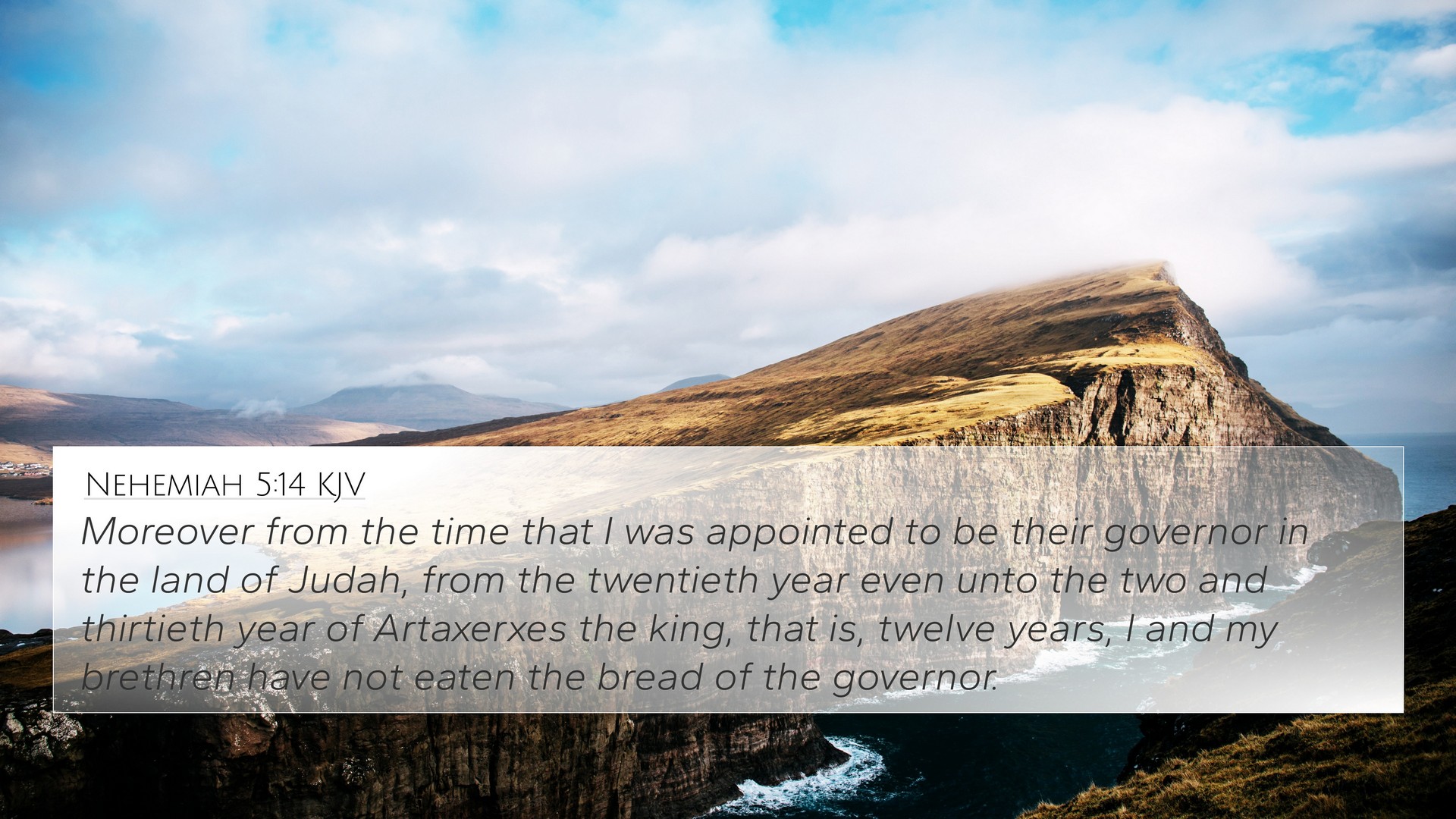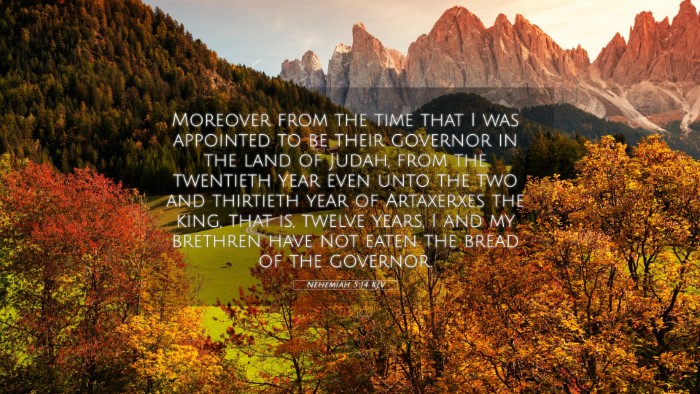Old Testament
Genesis Exodus Leviticus Numbers Deuteronomy Joshua Judges Ruth 1 Samuel 2 Samuel 1 Kings 2 Kings 1 Chronicles 2 Chronicles Ezra Nehemiah Esther Job Psalms Proverbs Ecclesiastes Song of Solomon Isaiah Jeremiah Lamentations Ezekiel Daniel Hosea Joel Amos Obadiah Jonah Micah Nahum Habakkuk Zephaniah Haggai Zechariah MalachiNehemiah 5:14 Similar Verses
Nehemiah 5:14 Cross References
Moreover from the time that I was appointed to be their governor in the land of Judah, from the twentieth year even unto the two and thirtieth year of Artaxerxes the king, that is, twelve years, I and my brethren have not eaten the bread of the governor.
Uncover the Rich Themes and Topics of This Bible Verse
Listed below are the Bible themes associated with Nehemiah 5:14. We invite you to explore each theme to gain deeper insights into the Scriptures.
Nehemiah 5:14 Cross Reference Verses
This section features a detailed cross-reference designed to enrich your understanding of the Scriptures. Below, you will find carefully selected verses that echo the themes and teachings related to Nehemiah 5:14 KJV. Click on any image to explore detailed analyses of related Bible verses and uncover deeper theological insights.
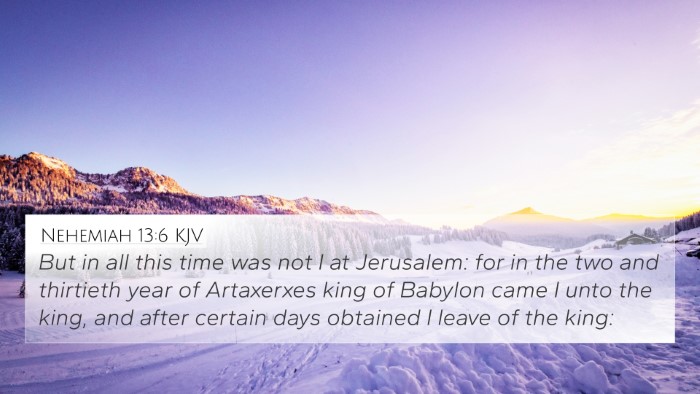
Nehemiah 13:6 (KJV) »
But in all this time was not I at Jerusalem: for in the two and thirtieth year of Artaxerxes king of Babylon came I unto the king, and after certain days obtained I leave of the king:
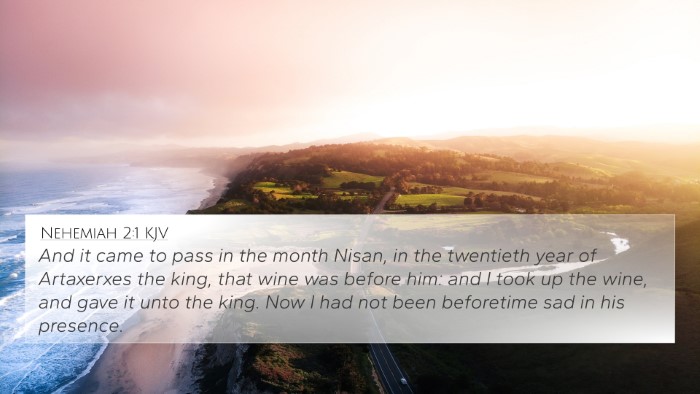
Nehemiah 2:1 (KJV) »
And it came to pass in the month Nisan, in the twentieth year of Artaxerxes the king, that wine was before him: and I took up the wine, and gave it unto the king. Now I had not been beforetime sad in his presence.
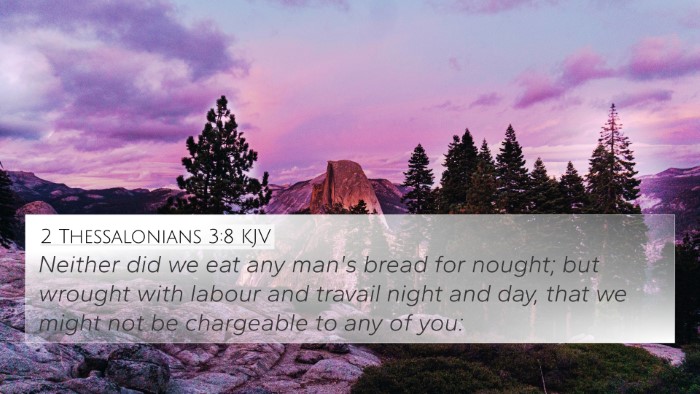
2 Thessalonians 3:8 (KJV) »
Neither did we eat any man's bread for nought; but wrought with labour and travail night and day, that we might not be chargeable to any of you:

Ezra 4:13 (KJV) »
Be it known now unto the king, that, if this city be builded, and the walls set up again, then will they not pay toll, tribute, and custom, and so thou shalt endamage the revenue of the kings.
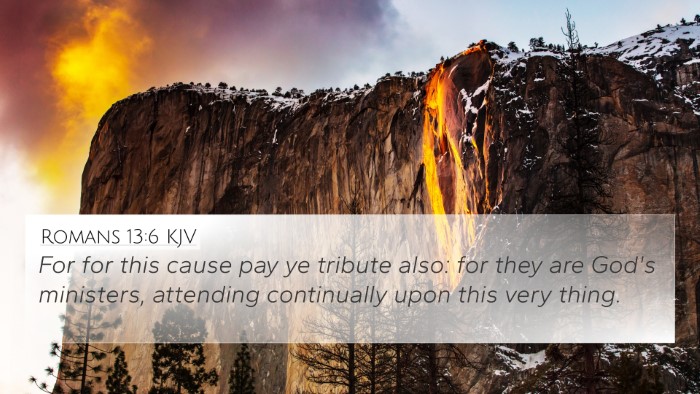
Romans 13:6 (KJV) »
For for this cause pay ye tribute also: for they are God's ministers, attending continually upon this very thing.

1 Corinthians 9:18 (KJV) »
What is my reward then? Verily that, when I preach the gospel, I may make the gospel of Christ without charge, that I abuse not my power in the gospel.
Nehemiah 5:14 Verse Analysis and Similar Verses
Understanding Nehemiah 5:14
Nehemiah 5:14 (NIV): "Moreover, from the twentieth year of King Artaxerxes, when I was appointed to be their governor in the land of Judah, until his thirty-second year, twelve years, neither I nor my brothers ate the food allotted to the governor."
This verse highlights Nehemiah's leadership and commitment to the welfare of his people over personal gain during his time as governor.
Verse Context
In the backdrop of the post-exilic community in Jerusalem, Nehemiah faced various challenges while striving to rebuild the city and restore its people. His leadership style is characterized by selflessness, a stark contrast to the oppressive practices of some governors who exploited their positions.
Commentary Insights
Matthew Henry's Commentary
Henry emphasizes that Nehemiah set an example of humility and service. By refusing the governor's provisions, he demonstrated his dedication to his responsibilities, providing an insightful lesson of putting others first.
Albert Barnes' Notes
Barnes points out that Nehemiah's tenure was marked by his integrity and disregard for personal comfort. By abstaining from the governor's food, he aimed to prevent any financial burden on the impoverished community. This act of self-denial was reflective of a good leader's heart.
Adam Clarke's Commentary
Clarke notes that Nehemiah's refusal to partake in the governor's allowances shows his unique position and characteristics as a leader among the Jews. His actions fostered trust and community spirit, essential for the collective rebuilding of Jerusalem.
Thematic Connections
Nehemiah 5:14 can be understood within broader biblical themes of leadership, sacrifice, and community. This verse links to various other scriptures that emphasize similar principles:
- Proverbs 29:2: Where the righteous rule, the people rejoice.
- 1 Peter 5:2-3: Shepherd the flock willingly, not for shameful gain.
- Philippians 2:3-4: Do nothing from selfish ambition but look to the interests of others.
- Matthew 20:26-28: The greatest among you will be your servant.
- Mark 10:43: Whoever wants to be great must be a servant.
- Luke 12:48: To whom much is given, much will be required.
- Isaiah 58:10: If you spend yourselves on behalf of the hungry, and satisfy the needs of the oppressed.
Cross-Referencing Biblical Texts
To gain a more profound understanding of Nehemiah 5:14, utilizing tools for Bible cross-referencing can be immensely valuable. The act of cross-referencing biblical texts allows readers to see thematic and doctrinal connections across different books and passages. Here are some insights:
- Identify Themes: Linking Bible scriptures provides insights into leadership traits and community guidelines.
- Contextual Analysis: Understanding Nehemiah's role in the larger narrative of Israelite history.
- Exploring Inter-Biblical Dialogues: Discovering relationships between Old Testament practices and New Testament teachings on leadership and service.
- Comparative Study: A comparative Bible verse analysis can show the continuity and consistency of God’s message regarding servant leadership.
Practical Applications
For modern readers, the implications of Nehemiah 5:14 extend beyond historical context. This verse calls believers to:
- Practice Selflessness: Encouraging leaders today to prioritize the welfare of their communities over personal gain.
- Cultivate Community Spirit: Building up trust and cooperation within groups, much like Nehemiah did.
- Lead by Example: Reflecting on how personal choices impact wider community dynamics.
Conclusion
Nehemiah 5:14 serves as a profound reminder of the principles of compassionate and servant leadership that resonate throughout both the Old and New Testaments. Those exploring this verse are encouraged to engage with cross-referencing biblical texts for a fuller understanding of its teachings and implications in various contexts.
